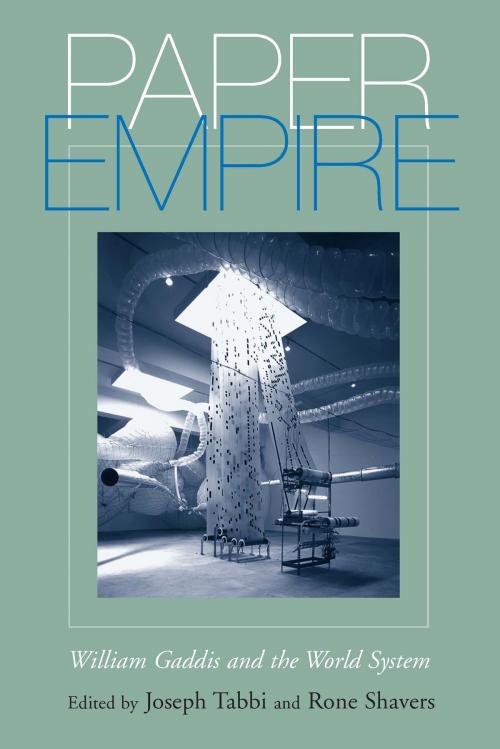Paper Empire
William Gaddis and the World System
Fiction & Literature, Literary Theory & Criticism, American| Author: | Michael Wutz, Jeff Bursey, Klaus Benesch, Nicholas Brown, Stephen J. Burn, Anja Zeidler, Anne Furlong, Tom LeClair, Joseph McElroy, Steven Moore, Stephen Schryer, Nicholas Spencer, Crystal K. Alberts | ISBN: | 9780817381523 |
| Publisher: | University of Alabama Press | Publication: | February 15, 2008 |
| Imprint: | University Alabama Press | Language: | English |
| Author: | Michael Wutz, Jeff Bursey, Klaus Benesch, Nicholas Brown, Stephen J. Burn, Anja Zeidler, Anne Furlong, Tom LeClair, Joseph McElroy, Steven Moore, Stephen Schryer, Nicholas Spencer, Crystal K. Alberts |
| ISBN: | 9780817381523 |
| Publisher: | University of Alabama Press |
| Publication: | February 15, 2008 |
| Imprint: | University Alabama Press |
| Language: | English |
Celebrates and illuminates the legacy of one of America’s most innovative and consequential 20th century novelists.
In 2002, following the posthumous publication of William Gaddis’s collected nonfiction and his final novel and Jonathan Franzen’s lengthy attack on him in The New Yorker, a number of partisan articles appeared in support of Gaddis’s legacy. In a review in The London Review of Books, critic Hal Foster suggested a reason for disparate responses to Gaddis’s reputation: Gaddis’s unique hybridity, his ability to “write in the gap between two dispensations,—between science and literature, theory and narrative, and —different orders of linguistic imagination.—
Gaddis (1922-1998) is often cited as the link between literary modernism and postmodernism in the United States. His novels—The Recognitions, JR, Carpenter’s Gothic, and A Frolic of His Own—are notable in the ways that they often restrict themselves to the language and communication systems of the worlds he portrays. Issues of corporate finance, the American legal system, economics, simulation and authenticity, bureaucracy, transportation, and mass communication permeate his narratives in subject, setting, and method. The essays address subjects as diverse as cybernetics theory, the law, media theory, race and class, music, and the perils and benefits of globalization. The collection also contains a memoir by Gaddis’s son, an unpublished interview with Gaddis from just after the publication of JR, and an essay on the Gaddis archive, newly opened at Washington University in St. Louis.
The editors acknowledge that we live in an age of heightened global awareness. But as these essays testify, few American writers have illuminated as poignantly or incisively just how much the systemic forces of capitalism and mass communication have impacted individual lives and identity—imparting global dimensions to private pursuits and desires—than William Gaddis.
Contributors:Normal0falsefalsefalseEN-USX-NONEX-NONEMicrosoftInternetExplorer4 Crystal Alberts, Klaus Benesch, Nicholas Brown, Stephen Burn, Jeff Bursey, Anne Furlong, Tom LeClair, Joseph McElroy, Steven Moore, Stephen Schryer, Rone Shavers, Nicholas Spencer, Joseph Tabbi,Michael Wutz, Anja Zeidler
Celebrates and illuminates the legacy of one of America’s most innovative and consequential 20th century novelists.
In 2002, following the posthumous publication of William Gaddis’s collected nonfiction and his final novel and Jonathan Franzen’s lengthy attack on him in The New Yorker, a number of partisan articles appeared in support of Gaddis’s legacy. In a review in The London Review of Books, critic Hal Foster suggested a reason for disparate responses to Gaddis’s reputation: Gaddis’s unique hybridity, his ability to “write in the gap between two dispensations,—between science and literature, theory and narrative, and —different orders of linguistic imagination.—
Gaddis (1922-1998) is often cited as the link between literary modernism and postmodernism in the United States. His novels—The Recognitions, JR, Carpenter’s Gothic, and A Frolic of His Own—are notable in the ways that they often restrict themselves to the language and communication systems of the worlds he portrays. Issues of corporate finance, the American legal system, economics, simulation and authenticity, bureaucracy, transportation, and mass communication permeate his narratives in subject, setting, and method. The essays address subjects as diverse as cybernetics theory, the law, media theory, race and class, music, and the perils and benefits of globalization. The collection also contains a memoir by Gaddis’s son, an unpublished interview with Gaddis from just after the publication of JR, and an essay on the Gaddis archive, newly opened at Washington University in St. Louis.
The editors acknowledge that we live in an age of heightened global awareness. But as these essays testify, few American writers have illuminated as poignantly or incisively just how much the systemic forces of capitalism and mass communication have impacted individual lives and identity—imparting global dimensions to private pursuits and desires—than William Gaddis.
Contributors:Normal0falsefalsefalseEN-USX-NONEX-NONEMicrosoftInternetExplorer4 Crystal Alberts, Klaus Benesch, Nicholas Brown, Stephen Burn, Jeff Bursey, Anne Furlong, Tom LeClair, Joseph McElroy, Steven Moore, Stephen Schryer, Rone Shavers, Nicholas Spencer, Joseph Tabbi,Michael Wutz, Anja Zeidler















